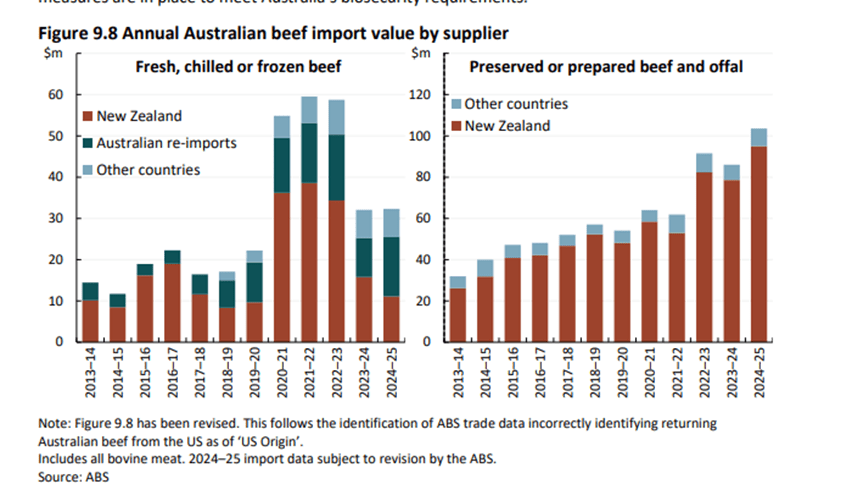ABARES Retracts Claims on US Beef Imports to Australia
This week, the Australian Bureau of Agricultural and Resource Economics and Sciences (ABARES) has officially retracted statements suggesting that fresh (chilled or frozen) beef from the United States has begun to arrive in Australia. The initial claims appeared in both graphical data and commentary within ABARES’ September Cattle & Beef Market Outlook report.
Beef Central, a well-regarded agricultural news outlet, highlighted the inaccuracies in an article published yesterday. In response, ABARES provided a statement clarifying the situation.
ABARES appreciates this issue being brought to its attention.
ABARES and the ABS have identified a reporting error in the source customs records for August and October 2024 that incorrectly categorized returning Australian beef (re-imports) from the US as being of ‘US Origin’.
Revisions have now been made to the ABARES September 2025 Agricultural Commodities report’s Beef and Cattle note.
Following Beef Central’s reporting, the ABARES website has issued an alert indicating revisions to the Beef & Cattle chapter of the initial report. The corresponding graphs displaying beef imports have also been revised to eliminate incorrect references to US beef imports, as shown below.

The Australian Bureau of Statistics (ABS) has also commented on the reporting error. Their statement confirms the mistake regarding the customs records and sheds light on their data collection methodology.
Following concerns raised in the article “ABARES, ABS get it wrong on first US beef imports to Australia,” both ABS and ABARES have identified a reporting error in the customs records from August and October 2024. This error incorrectly categorized returning Australian beef as being of ‘US Origin’. The ABS has no information on the reasons behind the re-imported Australian beef.
The ABS compiles its international merchandise trade statistics from customs declarations submitted to the Australian Border Force (ABF), focusing on larger value declarations, which is why discrepancies can occur.
For further information on this subject, please refer to the International Merchandise Trade, Australia: Concepts, Sources and Methods, 2018 | Australian Bureau of Statistics.
These erroneous claims regarding US beef imports triggered inquiries from multiple media outlets, including Sky News, which initially accepted the ABARES statements without verification.
Moving forward, it is crucial for organizations like ABARES and the ABS to maintain a high degree of accuracy in their reporting to avoid such inconsistencies, which can mislead the public and impact market perceptions.
This HTML-formatted article is ready for seamless integration into WordPress, featuring appropriate headings, paragraphs, and images to enhance readability.



